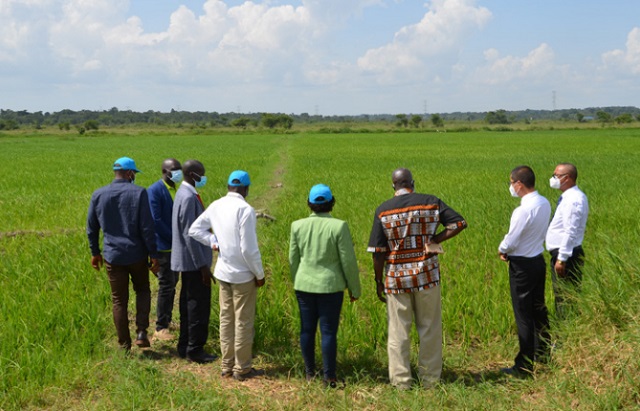
The West African country is the sixth country to visit Uganda to benchmark on SSC success
| THE INDEPENDENT | The Sierra Leonean government has lauded Uganda and FAO for championing the South- South and Triangular Cooperation (SSTC) framework, through which Uganda has registered milestones in agricultural production.
Following a week-long study tour and exposure visit to sites of implementation of SSTC interventions in Uganda, the Sierra Leonean delegation said the trip has strengthened their resolve to adopt the SSTC model, to accelerate the country’s target for rice production self-sufficiency by 2023.
South-South Cooperation is the mutual sharing and exchange of key development solutions – knowledge, experiences and good practices, policies, technology, and resources – between and among countries in the global South.
“The Government of Sierra Leone is willing to set-up a Unilateral Trust Fund to spur South-South Cooperation towards attainment of 80 percent rice self-sufficiency and food security. We are ready to learn and adopt relevant strategies, including those used by Uganda, for sustainable development of our agriculture, particularly rice production”, said Theresa Tenneh Dick, Deputy Minister of Agriculture in Sierra Leone at the end the visit at the Ministry of Finance, Planning and Economic Development in Kampala on May.27.
Mohamed Ajuba Sheriff, the acting Director General, Ministry of Agriculture and Forestry in Sierra Leone reiterated the country’s enthusiasm to learn from Uganda, revealing that when Sierra Leone initiated SSC, it had no model from which to draw lessons.
However, Sierra Leone has now adopted a policy shift involving mechanization, agricultural financing and provision of subsidies, which will complement realization of the target under SSC.
The five-member delegation also included; Alpha Yayah Mansaray- Senior Extension Officer and focal person for SSTC at the agriculture ministry; Harding Konneh- Deputy Secretary, Multi-lateral Trust Fund Department, Ministry of Finance and Harding Wuyango, Assistant FAO Representative (Programme), FAO Sierra Leone. They were accompanied by Peter Anaadumba- Regional SSTC Officer and Jean Baptiste Bahama- Regional Plant Production and Protection Officer.
Rice is the staple food for most Sierra Leoneans and it dominates Sierra Leon’s agriculture sector, contributing the most significant share to agricultural GDP. Although nearly 75 percent of the rural households are engaged in rice cultivation, domestic yields are low, leading to the importation of about 900 000 metric tonnes (MT) annually to plug the consumption gap. The development of the rice sector and the achievement of rice self-sufficiency is therefore of high national priority for Sierra Leone.
The delegation visited Zhong Industries and Kehong Uganda Industrial Development Limited in Masaka and Luwero Districts respectively, to learn about the ongoing FAO-China SSC interventions. They also toured Doho Rice Irrigation Scheme in Butaleja District, where they interacted with farmers whose lives and communities have changed thanks to SSC.
Partnerships spur agriculture and economic development
Sierra Leone is the sixth country to visit Uganda to benchmark on SSC success. Previous delegations were from Tanzania, Cote d’Ivoire, Senegal, Guinea Conakry and Guinea Bissau. In Africa, Uganda is one of the flagship programmes that FAO’s South-South Cooperation Unit can boast of, having gained a wealth of experience in striving towards food security, in the framework of SSC.
Uganda has used SSC to bolster its development by harnessing expertise from its counterparts in the Global South (including China and Venezuela), having been a beneficiary country of the first two phases of the FAO-China trust fund for SSC. In the third phase of SSC (2021-2023), Uganda will invest US$9.6 million, through the establishment of a Unilateral Trust Fund in FAO while the Chinese government will contribute about US$2.4 million.
Patrick Ocailap, deputy Secretary to the Treasury at Uganda’s Ministry of Finance, Planning and Economic Development stressed the importance of solid institutional arrangements and a tripartite involving the Ministry of Agriculture, the Ministry of Finance and the private sector, with FAO to facilitate collaboration with the donor country.
“Agriculture is the main stay of Uganda and the epicenter of developing our country. To make SSC work, a coordination mechanism is critical to enable the Government to mobilize the required resources, to attract the private sector to invest and create capacity and to ensure that numerous multiplier effects trickle down to the households”, he said.
“Through SSC and policy actions for rice promotion and production, such as the Uganda National Rice Development Strategy (NRDS), Uganda increased its rice production from 150 000 MT in 2008 to 246 000 MT to date and is targeting 740 000MT by 2030”, added Alex Lwakuba- Commissioner for Crop Production at the Ministry of Agriculture, Animal Industry and Fisheries (MAAIF).
Since learning is a mutual endeavor, Sierra Leone has invited her Ugandan counterparts to visit the West African country to learn about improved parboiled rice technology. Parboiled rice, with aromatic and long-shelf life properties, reduces starch and moisture content, making it a highly recommended food for diabetic patients.
Uganda has used SSC to increase agricultural production and profitability and introduced 25 new technologies such as hybrid rice, fox tail millet, maize, rice-fish culture as well as agricultural equipment and tools.
Antonio Querido, FAO Representative in Uganda, said with over ten years of experience in formulation and implementation of SSC, FAO in Uganda has a solid SSC programme and SSC team in place to support replication of its success by other countries. SSC is demand-driven and ensures strong principles of national ownership and leadership.
****
 The Independent Uganda: You get the Truth we Pay the Price
The Independent Uganda: You get the Truth we Pay the Price


